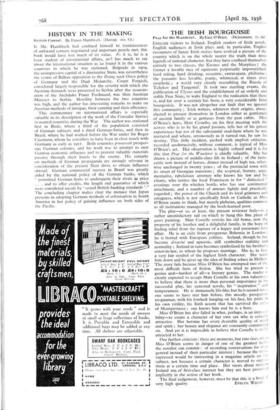THE IRISH- BOURGEOISIE
Pray for the Wanderer. By Kate O'Brien. (Heinemann. 7$. 6d.'
ENGLISH visitors to Ireland, English readers of Irish novels. English audiences at Irish plays and, in particular, English recounters of funny Irish stories have evolved a picture of the country which is on the whole neater the truth than most legends of national character, but they have confined themselves entirely to two classes, the Knoxes and the Min.phies the former a lovable race of squireens perpetually impoverished, hard riding, hard drinking, eccentric," extravagant, philistine ; the peasants less lovable, poetic, whimsical, at times even prophetic ; a world very closely resembling the Russia of Tchekov and Turgenief. It took two startling events, the publication of Ulysses and the establishment of an orderly and stable Free State, to wake England to the realisation that there is, and for over a century has been, a very considerable Irish bourgeoisie. It was not altogether our fault that we ignored this community ; Irish writers, whatever their origins, always elected to present themselves in London either as gentlemen of ancient family or as geniuses from the peat cabin. Miss O'Brien's hero, Matt Costello, on his first meeting with the actress who is to be his grand passion, tells her of his prison experiences but not of the substantial stud-farm where he was nurtured and where, erroneously as it turned out, he saw his destiny. This little incident, packed with implicit criticism, recorded unobtrusively, without comment, is typical of Miss O'Brien's art. Her observation- is highly refined and it is for this that Pray for the Wanderer is chiefly valuable. She has drawn a picture of middle-class life in Ireland ; of the farm- cattle now instead of horses, dinner instead of high tea, other- wise unchanged in twenty years ; of the provincial town with its street of Georgian mansions ; the sceptical, literary, argu- mentative, rabelaisian attorney who knows his law and his clients, who invites the local Franciscan in for " dialectical " evenings over the whiskey bottle, who has one sentimental attachment, and a number of amours lightly and practically regarded ; the power of the Church and its local grimness and smugness, which is not specifically Irish or Catholic as Miss O'Brien seems to think, but merely plebeian, qualities common to all institutions managed by the book-learned poor.
The plot—or so, at least, the present reviewer feels—is a rather unsatisfactory rail on which to hang this fine piece of genre painting. Matt Costello revisits his old home, now the property of his brother and a delightful family, in the hope of finding relief from the rupture of a happy and passionate love affair. He is an exile from prosperous Bohemia in London ; he is fretted with European politics. Ireland, though he has become deracine and agnostic, still symbolises stability and normality ; Ireland in turn becomes symbolised by his brother's sister-in-law, to whom he proposes marriage. She is, in fact, a very fair symbol of the highest Irish character. She turns him down and he gives up the idea of finding solace in Mellick. The story fails because Miss O'Brien has attempted two of the most difficult feats of fiction. She has tried to present a genius and—hardest of all—a literary genius. The reader is clearly expected to accept Matt Costello at his own valuation: to believe that there is more than personal importance in hk successful play, his censored novels, his " inspiration " and temperament. He is immensely life-like, but he is second-rate : one seems to have met him before, this moody, prosperous ex-gunman, with his forelock hanging on his face, his pride in his own virility, his Irish accent that has survived the cafes of Montparnasse ; one knows him and he is a bore.
Miss O'Brien has also failed in what, perhaps, is an impossi- bility—to create a character of her own sex who is sexually attractive. Her heroine has every desirable quality of mind and spirit ; her beauty and elegance are constantly commented on. And yet it is impossible to believe that Costello is really attracted to her.
One further criticism : there are moments, but rare ones,
Miss O'Brien seems in danger of one of the greatest faults the novelist can commit : of recording conversations for th.::r general instead of their particular interest ; because the vicA expressed would be interesting in a magazine article on taz subject, not because a certain character is moved to exprc` them at a certain time and place. Her views about modcrn Ireland are-of first-class interest but they are best presewed implicitly in the' action of her book.
The final judgement, however, must be that this is a book


























































 Previous page
Previous page